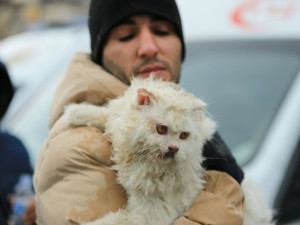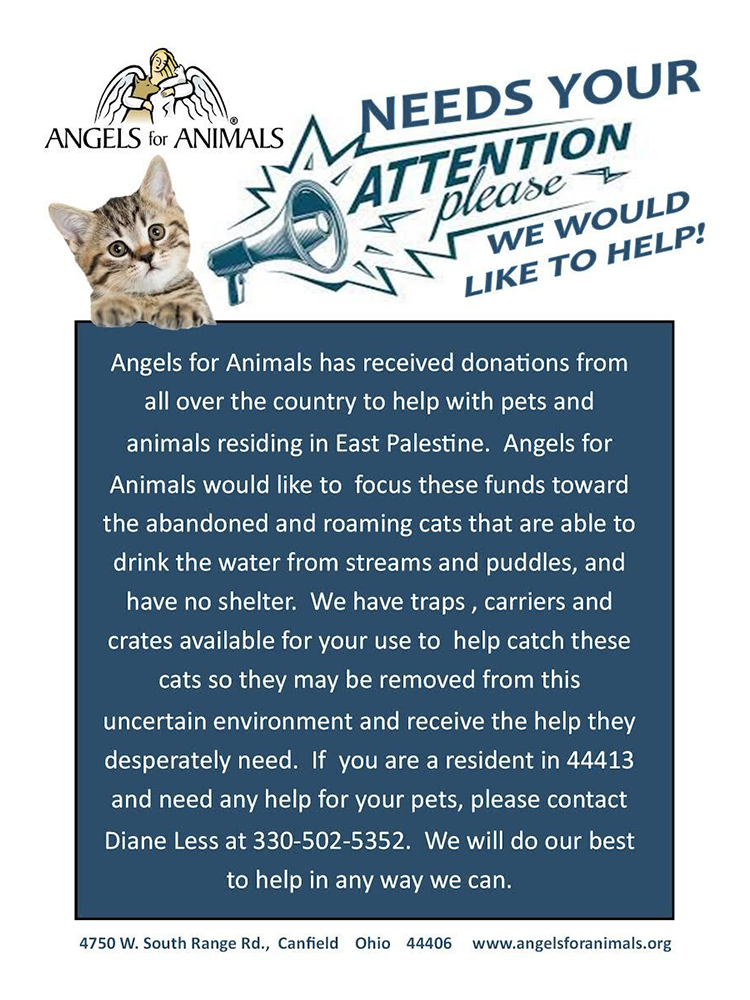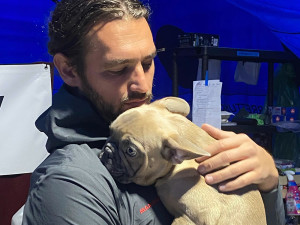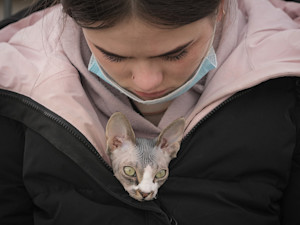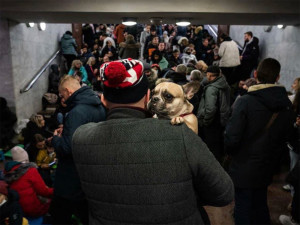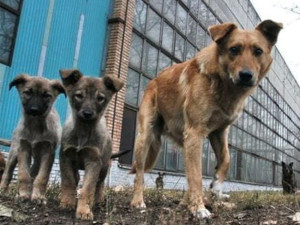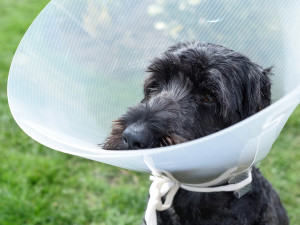The East Palestine, Ohio Crisis Is Affecting Pets, Too
Residents have reported concerning health problems with their animals.

Share Article
On February 3, a train, operated by rail operator Norfolk Southern, carrying 20 cars containing toxic chemicals derailedopens in a new tab in East Palestine, Ohio. About 1,500 residentsopens in a new tab within a one-mile radius of the event evacuated, but on February 8, government officials told them it was safeopens in a new tab to return home. In the weeks following the incident, East Palestine residents have been reporting distressing signs of toxic contamination: smells of burning tires or plastic; fish and frogs floating in nearby water sources; rashesopens in a new tab, nausea, and trouble breathing; and — alarmingly, signs that their pets have been affectedopens in a new tab.
Pets are getting sick and dying.
“My phone is just going all day,” Teresa McGuire, Columbiana County Humane Society opens in a new tab executive director, toldopens in a new tab Ohio newspaper The Herald-Star on Monday. The humane society is compiling a list of pets who have gotten sick or died following the crash. She added that it’s “suspect” that pets are showing signs of illness or are dying at the same time following the train derailment.
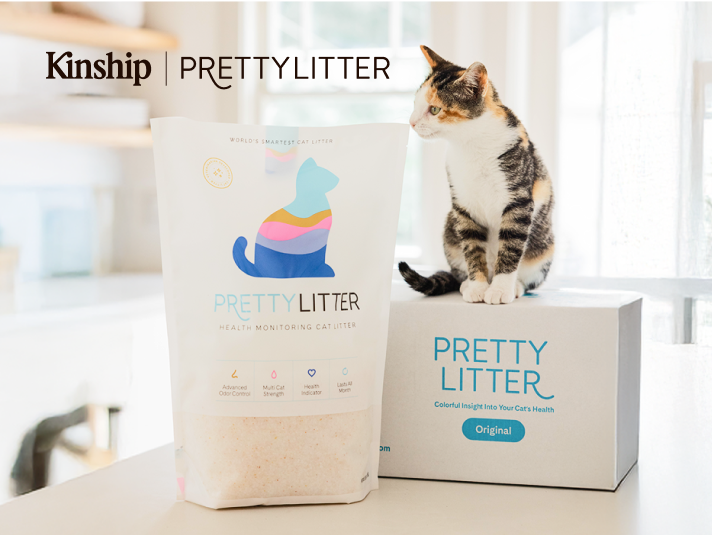
Save on the litter with color-changing tech that helps you better care for your cat.
McGuire added that several of the pets were diagnosed with vinyl chloride poisoning; vinyl chloride was one of the chemicals that was released from the train derailment. She added that the humane society has received reports about sick animals who live seven miles outside of the evacuation zone.
Following the event, officials performed a controlled burn of the area, which released further vinyl chloride, a known carcinogen — or chemical that can cause cancer — into the air. McGuire told The Herald-Star that the humane society got one report of a small dog, who lives within one mile of the evacuation zone, whose hind legs became paralyzed after the controlled burn and has still not regained full movement. The dog’s vet has confirmed that the dog has poisoning of some kind.
This is resulting in expensive vet bills.
Andrea Belden told CBS Newsopens in a new tab that, shortly after she evacuated her two cats, Pepper and Leo, from their East Palestine home, she saw that something was wrong with Leo: “I noticed that he was breathing really heavy. It was super labored, and it was fast. His heart rate was up.” When Leo wasn’t better the next day, Belden took him to the vet, where, after many tests, he showed signs of possible chemical pneumonitis and highly elevated liver enzyme levels.
Belden added that her vet told her “Leo’s signs could be due to vinyl chloride gasses, as it can cause respiratory, heart and liver issues in humans.” Belden said she received an estimate for Leo’s treatment for between $15,000 to $18,000, something that Norfolk Southern said they would not help with at the moment but advised her to file a damaged property claim. Per opens in a new tab, Belden had to have Leo put to sleep and still owed $9,678.23 for the treatment he received.
“These families have already been through enough,” McGuire told The Herald-Star. “We’re in a scrappy, blue-collar community. Some people already had to pay for food and hotels while they were displaced. Now they have to pay for vet bills.”
Pets were left behind.
After residents were told to evacuate earlier this month, they had to do decide what to do with their pets. As Erica Riceopens in a new tab, who works as a state humane agent with East Palestine neighboring shelter Columbiana County Humane Society, told opens in a new tabColumbus news station WKYC on Feb. 7, some East Palestine residents were not able to take their pets with them as they evacuated. Those who could dropped their cats or dogs off at a nearby shelter.
“It is a packed house. It’s pretty noisy,” Rice told the news station at the time. “It is very stressful for these dogs, who are used to being in family homes.” The news report noted that not everyone was able to leave their dogs in the care of shelter volunteers; some had to leave their pets behind in the evacuation zone.
Diane Less, founder of Angels for Animals, told Kinship in a Feb. 21 phone interview that her organization took in about 12 to 15 cats from residents who had to evacuate. Half of those cats were not spayed or neutered. They have all been returned to their families now, but during their stay, Angels spayed or neutered those who needed the procedures.
Less told Kinship that in the days ahead “efforts are being focused on trying to remove free-roaming cats from the town,” where toxins remain on the ground and in the water. She also encouraged residents to provide these cats with safe, bottled drinking water and shelter, if they are able to do so. While she is concerned for stray dogs, Less said that the stray cat population in the area is out of control. From the beginning of May through the end of the year, she said they receive 20 to 40 stray cats a day, which is a result of people failing to spay and neuter cats.
On Feb. 22, Less said she and another Angels board member will be traveling to East Palestine when former President Trump visitsopens in a new tab the town. They plan to hand out flyers about how to help local stray pets to residents they meet, including the mayor, police chief, and fire chief.
“This will get the ball rolling. We will need boots on the ground to pull this off,” she said, adding that Angels is fundraising for their BOGO spay/neuter event, mentioned at the bottom of this page hereopens in a new tab. With this special, someone can bring in two cats and receive one spay or neuter for free. Less said that donors can specify that they’d like their BOGO funds to go toward East Palestine rescues, as Angels aims to continue to help strays in the area.
Animal Charity of Ohioopens in a new tab told local news outlet WKBN opens in a new tabthat they were also stepping up to help and were gathering resources — including crates and kennels for cats and dogs.
How you can help these pets now.
If you are outside of the East Palestine area and want to help, Columbiana County Humane Society accepts donations. You can donate to Angels for Animals and to Animal Charity of Ohio. Kinship will add more resources as we become aware.
This is an interspecies crisis.
As Syracuse University’s Falk College School of Social Work Professor Avivia Vincent noted in a reportopens in a new tab on Monday, pet and human health will be affected far beyond the immediate release of toxins. More than 3,500 fish have died and livestock have been killedopens in a new tab or moved out of the state, which will have an impact on how and from where pets and humans receive their food.
She writes: “Human livelihood is reliant on the economic industry of livestock, and livestock are reliant on the land...From this instance, we learn that we are not prepared for interspecies disaster. Readiness should include emergency shelters being pet/livestock ready, readily available transportation for livestock, water reserves when natural sources are contaminated, funding allocation, and other considerations. Environmental justice is an interspecies issue.”
Vincent notes that evacuated residents can call Norfolk Southern Family Assistance Center: 46469 State Route 46 New Waterford Ohio, 1-800-230-7049. People can also call residential reentry at 330-849-3919 for air and water testing and receive mental health support at dsmith.nasw.oh@socialworkers.org.

Hilary Weaver
Hilary Weaver is the senior editor at Kinship. She has previously been an editor at The Spruce Pets, ELLE, and The Cut. She was a staff writer at Vanity Fair from 2016 to 2019, and her work has been featured in Esquire, Refinery 29, BuzzFeed, Parade, and more. She lives with her herding pups, Georgie and Charlie.
Related articles
![Two women, one with dark curly hair and deep skin and one with pink-blonde hair and lighter skin petting their grey cat]() opens in a new tab
opens in a new tabYes, You Should Spay/Neuter Your Cat. Here’s Why
A veterinarian breaks down how it keeps your pet healthy and curbs kitten overpopulation.
![Andrew Kushnir, Nomad Vet, with pug]() opens in a new tab
opens in a new tabMeet Andrew Kushnir, “the Nomad Vet” Helping Refugee Pets in Ukraine
The veterinarian on helping out, making a difference, and the finer things in life (mostly dogs and music).
![a cat rests in a girl's jacket]() opens in a new tab
opens in a new tabMeet the Photographer Documenting Pets at the Ukraine Border
Christopher Furlong is helping fleeing pets and people tell their stories.
![A man holding a dog in a crowded space in Ukraine.]() opens in a new tab
opens in a new tabHow You Can Help Ukraine’s Animals
These Ukrainian rescue organizations need our support. Here’s how to get it to them ASAP.
![dr lachlan campbell australian vet in ukraine]() opens in a new tab
opens in a new tabAustralian Vet Dr. Lachlan Campbell on Saving Animals in Ukraine
Bombs, mines, and military checkpoints won’t stop him from evacuating animals from Irpin and running a pop-up vet clinic in Lviv for refugees and their pets.
![black scruffy dog wearing cone recovering from spay surgery]() opens in a new tab
opens in a new tabEverything You Need to Know About Spaying and Neutering Your Dog
A vet’s take on why it’s a smart choice. Snip, snip!
